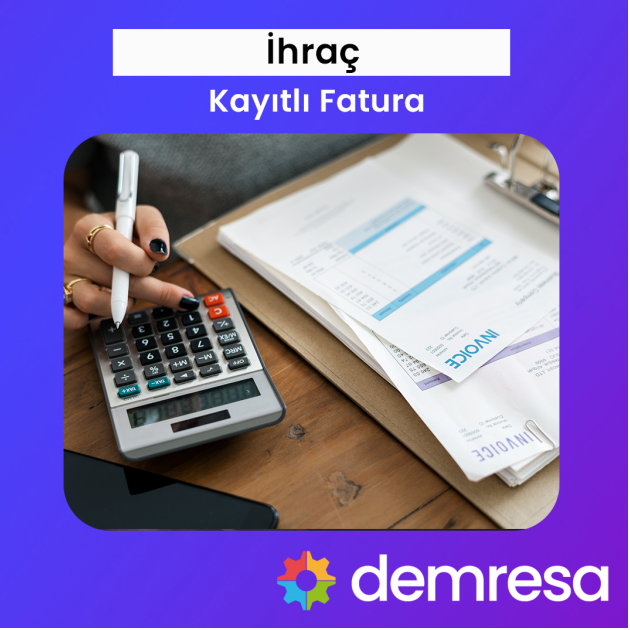
What is an Export-Registered Invoice and How is it Issued?
An export-registered invoice is a special type of invoice that allows a manufacturer in Türkiye to sell goods to another company that will directly export them, without calculating VAT (Value Added Tax). This practice has been developed both to promote the country's exports and to ease the financial burden on producers. Export-registered sales are regulated by Article 11/1-c of the VAT Law No. 3065 and related communiqués. Under this system, the manufacturer can sell without VAT, provided that the exporting company actually exports the goods abroad within a certain period.
From the producer’s perspective, export-registered invoices enable them to quickly claim or offset the VAT incurred during production. The exporting company, on the other hand, must physically export the goods it receives from the manufacturer, generally within 3 months from the invoice date. Otherwise, the manufacturer will be obliged to pay the VAT—initially not collected at the time of sale—to the tax office later on. Therefore, careful document management, time tracking, and full legal compliance are required for both the manufacturer and the exporter throughout this process.
Important Note
VAT is not calculated on export-registered invoices, and the statement “Issued as export-registered according to Article 11/1-c of VAT Law No. 3065” must appear on the invoice. In addition, the export period and other legal requirements must be closely monitored.
To ensure that export-registered invoices are issued correctly and in accordance with the law, both the manufacturer and the exporter have mutual responsibilities. The stages and key points for issuing an export-registered invoice are summarized below as cards:
Invoice Issuance
When the manufacturer sells goods as export-registered, VAT is not calculated and the legal statement must appear on the invoice. The invoice must include buyer (exporter) information, detailed product descriptions, quantities, and delivery terms.
Period Tracking & Obligations
The exporter must actually export the goods abroad, usually within 3 months from the date of receipt. If this period is exceeded, the manufacturer is required to pay the unpaid VAT plus interest to the tax office.
Key steps to consider when issuing an export-registered invoice are listed below:
- Agreement Between Manufacturer and Exporter: A written agreement between the parties is recommended. The agreement should clearly state that the sale is export-registered, the delivery and export dates, and any possible penalties.
- Legal Statement: The invoice must clearly state that VAT is not calculated and include the “export-registered” note.
- Document Tracking: When the export is completed, the customs export declaration, invoice, and delivery note should be kept and submitted when necessary.
- VAT Refund/Offset: Once the export is completed and all documents are provided, the manufacturer can reclaim or offset the VAT incurred during production.
Required Invoice Details
Invoice number, issue date, buyer and seller information, product descriptions, delivery and payment terms, “export-registered” note, and legal basis must all be included without omission.
Customs Export Declaration
After the goods are exported, the exporter must provide the customs export declaration to the manufacturer, who then uses it to initiate the VAT refund process.
VAT Refund
The VAT incurred by the manufacturer for the export-registered sale is refunded or offset against other taxes, once the required documents are submitted.
Tip
Any deficiencies or delays in invoices or documents will slow down the VAT refund process and may lead to additional penalties for both parties. Accuracy and timely processing of all documents ensures a smooth process.
Benefits of Export-Registered Invoices
The export-registered invoice system offers significant advantages to both manufacturers and exporters. For the manufacturer, the main benefit is the ability to sell goods without collecting VAT and to quickly reclaim or offset the VAT incurred once the export process is completed. This has a positive effect on cash flow and allows the company to direct its capital toward production rather than operating costs. At the same time, inventory costs are reduced and new resources for export-oriented investments can be created.
For the exporter, the ability to procure goods without paying VAT means both cost savings and a competitive advantage. In sectors where price sensitivity is high in international markets, this advantage can help increase sales and market share. Also, as long as all procedures are followed, there are no additional tax risks or obligations for either party.
Positive Impact on Cash Flow
The manufacturer minimizes cash outflow by selling goods without VAT and quickly receives a VAT refund, thereby reducing financial burden.
Competitive Advantage
The exporter, by procuring goods without VAT, gains a price advantage in international markets and can make more competitive offers.
- Fast VAT Refund: VAT refund procedures are accelerated when documents are submitted completely.
- Inventory & Financial Management: Manufacturer’s inventory costs are reduced and working capital is strengthened.
- Legal Assurance: No additional tax or legal liabilities arise for either party if procedures are followed correctly.
Expert Advice
To fully benefit from export-registered invoices, make sure to carefully follow all legal procedures and deadlines throughout the process.

For Which Products Can Export-Registered Invoices Be Issued?
In general, export-registered invoices can be issued for all products that are in free circulation and sold for the purpose of direct export. The main requirement is that these products must actually be exported from Türkiye. Products covered by export-registered invoices issued by the manufacturer may include a wide range such as industrial goods, agricultural products, food, textiles, machinery, and chemicals. Especially for products where VAT is incurred during production and the official export is declared, export-registered sales are possible.
As an exception, some products or sectors may be excluded from export-registered sales under current regulations. This type of invoice cannot be used for products not directly exported abroad, those intended for domestic consumption in Türkiye, or those whose export or import is restricted. It is essential to regularly check current circulars and lists published by the relevant ministries and authorities.
Industrial Products
Machinery, electronics, automotive parts, furniture, packaging, plastic products, and all kinds of industrial goods can be sold as export-registered.
Agricultural and Food Products
Grains, legumes, fruits and vegetables, bakery products, dairy and meat products can also be sold as export-registered.
Textiles and Ready-to-Wear
Fabrics, apparel, garments, yarn, and technical textiles can all utilize export-registered invoices for export.
Chemicals and Related Industries
Paint, detergents, fertilizers, plastic raw materials, and various chemical products are also among those that can be sold as export-registered.
Tip
For up-to-date restrictions and regulations by product group, regularly follow the announcements of the Ministry of Trade and the Revenue Administration.
Important Points to Know When Issuing Invoices
When issuing export-registered or general export invoices, there are many important details that must be considered to ensure compliance with regulations and to protect the rights of both exporters and producers. Each step of the invoicing process must include complete and accurate information, all required legal statements, and timely archiving of all documents. This ensures the VAT refund process runs smoothly and also prevents possible tax, insurance, or commercial disputes in the future. In addition, consistency among the invoice, delivery note, customs declaration, and other supporting documents is mandatory. Therefore, particular attention should be paid to the following points when issuing an invoice:
Complete Information and Legal Statement
The invoice must contain complete seller and buyer information, product details, delivery terms, issue date, invoice number, and the “export-registered” statement. The legal basis must be clearly indicated.
Consistency Among Documents
The product, quantity, date, and delivery details in the invoice, delivery note, and customs export declaration must all be consistent. Any discrepancies may cause delays in the VAT refund process.
Document Retention and Archiving
The invoice and all supporting documents must be stored securely, either digitally or physically, for the legally required period and be easily retrievable when needed.
- Currency: The currency used in the invoice should match the export contract, and all amounts must be clearly stated.
- Delivery Term and HS Code: Delivery terms (FOB, CIF, DDP, etc.) and HS code must be written completely and accurately.
- Number and Date Tracking: The invoice number and issue date must be consistent with the export declaration.
Tip
If in doubt when preparing an invoice, consulting a customs broker or certified public accountant ensures a secure process. Keep up to date with current legislative changes.
Sample Export-Registered Invoice and Implementation Guide
Learning how the export-registered invoicing process works in practice—through a sample invoice and step-by-step application guide—minimizes the risk of mistakes. Below you can find a sample export-registered invoice format, along with a practical implementation guide. Key legal statements, document management, and mutual obligations that must appear on the invoice are clearly indicated.
Sample Invoice Content
- Invoice No & Date: 2024/1501 – 18.07.2024
- Seller Company: Ornek Makina Sanayi A.S.
- Buyer Company: ABC Export Ltd. Sti.
- Product Information: CNC Lathe Machine, 2 Units
- Unit Price & Total: 15,000 USD – 30,000 USD
- Delivery Term: FOB Istanbul
- Legal Statement: “Issued as export-registered in accordance with Article 11/1-c of VAT Law No. 3065.”
Implementation Steps
- The manufacturer and exporter sign a contract, and the manufacturer issues an “export-registered invoice.”
- The goods are delivered to the exporter with a delivery note.
- The exporter exports the goods abroad within the specified period.
- The customs export declaration and other documents are provided to the manufacturer.
- The manufacturer applies for a VAT refund.
Important Note
If the legal statement is missing or deadlines are not met, the manufacturer will be required to pay the VAT with interest. Always check documents and compliance at each step.
Export-Registered Invoice Frequently Asked Questions
The export-registered invoice system raises many practical questions for producers, exporters, and accounting departments due to the complexity of the regulations and procedures. Below you can find the most common questions encountered in practice and their concise answers:
Is VAT calculated on export-registered invoices?
VAT ApplicationNo. VAT is not calculated on export-registered invoices. The manufacturer does not collect VAT at the time of sale. However, if the export is not completed within the specified period, the manufacturer must pay the VAT to the tax office retroactively.
What is the delivery period in export-registered sales?
Deadline TrackingThe exporter must export the goods abroad, generally within 3 months of receiving them. If necessary, this period can be extended once with the approval of the relevant tax office.
Which documents are required to claim a VAT refund?
Document ManagementTo claim a VAT refund, you must submit the export-registered invoice, customs export declaration, delivery note, and the exporter’s export invoice, along with all supporting documents, completely and accurately.
What happens if the goods are not exported within the period?
Legal ResponsibilityIf the goods are not exported within the specified period, the manufacturer is liable to pay the VAT not collected at the time of sale, along with late payment interest. Additional penalties may also be applied.
In which sectors can export-registered invoices be applied?
Sectoral ScopeExport-registered invoices can be used in all sectors and for all products that are eligible for direct export, including industry, agriculture, food, textiles, and machinery, except those prohibited or excluded by regulation.
What is the required legal statement for export-registered invoices?
Legal BasisThe invoice must clearly state: “Issued as export-registered in accordance with Article 11/1-c of VAT Law No. 3065.”
Tip
For updated legislation, procedures, or sector-specific details, consult your Certified Public Accountant or Customs Broker for the most current advice and support.
